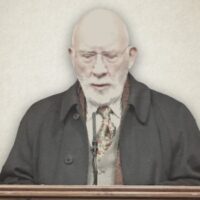
The Problem of Fullerism
The Problem of Fullerism
by Paul Fahy
(Understanding Ministries)
The system of unbiblical doctrines known as Fullerism is becoming popular in our present-day Reformed churches. Originally launched by a small Latitudinarian clique in the late 18th cent., it was denounced by Fuller’s Reformed contemporaries as ‘a gangrene in the churches’. In 1877, the Gospel Magazine joined most of the major Christian periodicals in condemning Fuller’s “excessive and antiscriptural ideas” and testified to their “unfeigned abhorrence of a system that robs God of His glory”. Some modern ex-Reformed evangelicals think they know better and are now proclaiming that Fullerism is the surest way to sound evangelism and the right preaching of the gospel. This is a scandal of major proportion and a testimony that we are now in those perilous times when judgement must begin at the house of God and even the righteous are scarcely saved (I Peter 4:17 ff.).
In the first section of the booklet under review, Paul Fahy clearly and accurately describes the follies of Fullerism and displays its wayward, deceitful and God-dishonouring gospel. He demonstrates succinctly how Fuller’s heretical views concerning faith, Scripture, atonement, justification, sin, righteousness, imputation, law, grace, God’s will, election, predestination, sanctification and evangelism are a mock version of the redemption which is in Christ Jesus. This twenty-one-page refutation of Fullerism could hardly be bettered. It would make an excellent ‘stand-alone’ tract to hand out to those endangered by Fullerism.
However, Paul Fahy spoils an excellent work by affixing to it thirty-two pages of no less than nine appendices. These confuse and contradict the position he takes in the main essay and contain highly questionable ideas concerning so-called duty-faith and the relationship of law to gospel. Here, Fahy strives to make our Reformers and Puritans, and especially John Gill, toe the line with Arthur Pink concerning the alleged duties of the unconverted to exercise saving faith. In doing so, he puts forward antitheses which were certainly never taught by those whom he claims are his mentors. Fahy teaches that the Apostles never preached the law but instead ‘preached Christ’, thus drawing a false dichotomy between the law and the Fulfiller of it. Where the Spirit works in preaching, Fahy argues, the law is never applied. This separates the Spirit from His Word. Furthermore, Fahy claims that the law has only reference to Jews and not Gentiles. This leaves him with two different gospels. If Christ only suffered vicariously under the law for Jews only, what hope is there for Gentiles? Fahy quotes 1 Corinthians and Galatians as evidence of this ‘no law’ approach but Paul clearly uses the law here to show the Corinthian church that adultery and fornication are still amongst them and in Galatians, he argues throughout from the curse of the law to the blessings of faith. Like Christ, the Apostles began at Moses and all the prophets and explained Christ’s fulfilment of their teaching. They were most diligent to show that both Jews and Gentiles fall short of God’s standards as revealed in His law. In preaching, sinners need to be confronted with their sins. Oddly enough, Fahy suggests that in my Introduction to William Rushton’s Particular Redemption, I fully back his teaching. I do not. Nor does Rushton. Buy the booklet, however, for the sake of the excellent opening essay.
George Ella
——————————————
George M. Ella is a historian, author and biographer. His writings may be accessed at the online archived, ”Biographia Evangelica”.
George M. Ella, born February 1939 in Yorkshire, England, has lived most of his life on the European Continent. He is a retired Senior Civil Servant formerly employed in teaching, post-graduate teacher-training, chairing examination boards and curricula work. He holds degrees from London, Hull, Uppsala, Essen, Duisburg and Marburg universities with doctorates in English Literature and Theology. Dr. Ella has written regularly since the seventies for a number of magazines and newspapers and published numerous books on Church History, including biographies of William Cowper, William Huntington, James Hervey, John Gill, Augustus Montague Toplady, Isaac McCoy and Henry Bullinger besides works on doctrine and education. He is currently finishing the third volume of his series 'Mountain Movers'; a biography of John Durie; a work on Law and Gospel and further study material for the Martin Bucer Seminar. Dr. Ella is still internationally active as a lecturer and is a Vice-President of the Protestant Reformation Society. He is keenly interested in missionary work and has written on the spread of the Gospel amongst the Same people of Lapland, the people of India and the Native Americans. This present volume follows Dr. Ella's 'The Covenant of Grace and Christian Baptism', also published by the Martin Bucer Seminar. George Ella is married to Erika Ella, nee Fleischman, a former government administrator, and they have two sons Mark (41), Director of a Polytechnic College in Bremerhaven and Robin (39), Leading Senior Physician in a newly-built Geriatric and Psychiatric clinic in Dessau.
George Ella on Doctrinal Matters
George Ella's Biographical Sketches




